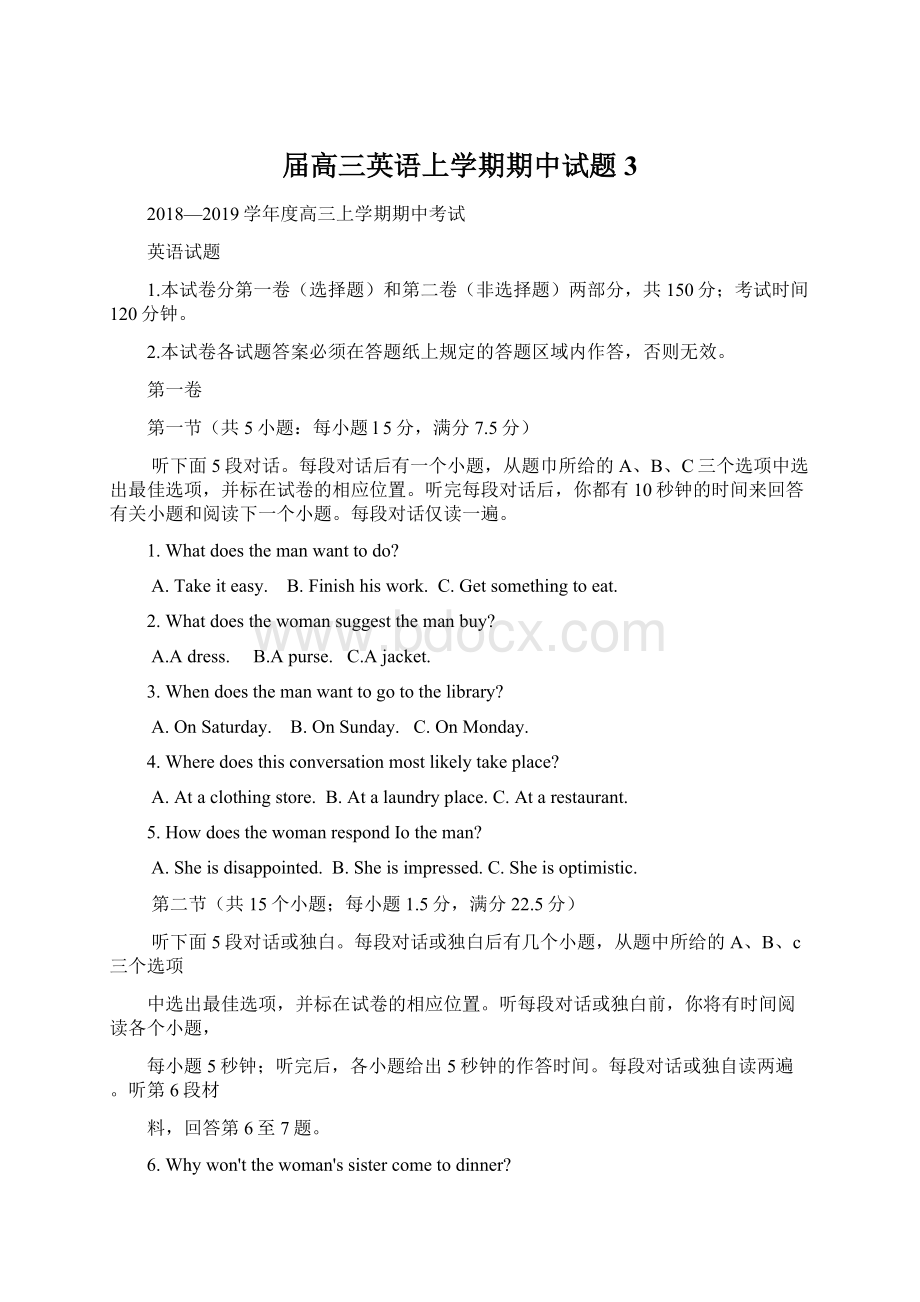届高三英语上学期期中试题3Word文档下载推荐.docx
《届高三英语上学期期中试题3Word文档下载推荐.docx》由会员分享,可在线阅读,更多相关《届高三英语上学期期中试题3Word文档下载推荐.docx(13页珍藏版)》请在冰豆网上搜索。

第二节(共15个小题;
每小题1.5分,满分22.5分)
听下面5段对话或独白。
每段对话或独白后有几个小题,从题中所给的A、B、c三个选项
中选出最佳选项,并标在试卷的相应位置。
听每段对话或独白前,你将有时间阅读各个小题,
每小题5秒钟;
听完后,各小题给出5秒钟的作答时间。
每段对话或独自读两遍。
听第6段材
料,回答第6至7题。
6.Whywon'
tthewoman'
ssistercometodinner?
A.Shehastoworklate.B.Shehasanappointment.C.She'
sinanothertown.
7.Howdoesthemanfeelaboutthedinnertonight?
A.Heisveryexcited.B.Heisalittledisappointed.C,Heisquiteangry.
听第7段材料,回答第8至9题。
8.Wheredoesthewomanplantogo?
A.SanFrancisco.B.Sacramento.C.LosAngeles.
9.WhatisthebestwaytoseeCaliforniaaccordingtotheman?
A.Gother
ebyplane.
B.Takethetrainalongthecoast.
C.GothroughthecenterofCalifornia.
听第8段材料,回答第10至12题。
10.Whydidthemanfallasleep?
A.Heissick.B.Heworksatnight.C.Hisclasswasboring.
11.WhydoesThemanhavetowork?
A.Topayforschool.B.Topayhisdebts.C.Topayhishospitalhill.
12.Wherewillthemanprobablygonext?
A.Toaclass.
B.Tothefinancialaidoffice.
C.Tothestudentemploymentoffice.
听第9段材料,回答第13至16题。
13.Howdidthewomangetthecomputer?
A.Sheorderedit.B.SheborroweditC.Itwasagift.
14.Whatsurprisesthemanaboutthecomputer?
A.Thesize.B.Theprice.C.Thecolor.
15.Whatdidthewomandointhecafetoday?
A.Shetalkedwithafriend.
B.Sheworkedonherresume.
C.Shelookedforajobthere.
16.Howdoesthewomanfeelaboutnoisycafes?
A.Shedislikesthenoise.B.Sheignoresthenoise.C.Sheisinspiredbythenoise.
听第10段材料,回答第17至20题。
17.Whatisrequiredforguests?
A.AphotoID.B.Alifejacket.C.Gymshorts.
18.Whatmustbereportedtothegymstaf
f?
A.Spitting.B.Children'
s"
accidents"
.C.Anyillnessafterswimming.
19.Atwhatagecanchildrenswimalone?
A.Nineyearsold.B.Tenyearsold.C.Elevenyearsold.
20.Whichpoolpolicyhaschanged?
A.Thebusinesshours.B.Theshoweringrules.C.Requiredswimmingclothes.
第二部分:
阅读理解(共两节,满分40分)
第一节:
(共15小题,每小题2分,满分30分)
阅读下列短文,从每题所给的四个选项(A、B、C和D)中,选出最佳选项,并在答题卡上将该项涂黑。
A
U
niversityRoomRegulations
ApprovedandProhibitedItems
Thefollowingitemsareapprovedforuseinresidential(住宿的)rooms:
electricblankets,hairdryers,personalcomputers,radios,televisionsandDVDplayers.Itemsthatarenotallowedinstudentroomsinclude:
candles,ceilingfans,fireworks,waterbeds,sunlampsandwirelessrouters.PleasenotethatanyprohibiteditemswillbetakenawaybytheOfficeofResidenceLife.
AccesstoResidentialRooms
Studentsareprovidedwithacombination(组合密码)fortheirroomdoorlocksuponcheck-in.Donotshareyourroomdoorlockcombinationwithanyone.TheOfficeofResidenceLifemaychangethedoorlockcombinationatanytimeattheexpenseoftheresidentifitisfoundthatthestudenthassharedthecombinationwithothers.Thefeeis$25tochangearoomcombination.
CookingPolicy
Studentslivinginbuildingsthathavekitchensareonlypermittedtocookinthekitchen.Studentsmustcleanupaftercooking.Thisisnottheresponsibilityofhousekeepingstaff.Kitchensthatarenotkeptcleanmaybeclosedforuse.Withtheexceptionofusingasmallmicrowaveoven(微波炉)toheatfood,studentsarenotpermittedtocookintheirrooms.
PetPolicy
Nopetsexceptfisharepermittedinstudentrooms.Studentswhoarefoundwithpets,whethervisitingorownedbythestudent,aresubjecttoaninitialfineof$100andacontinuingfineof$50adayperpet.Studentsreceivewrittennoticewhenthefinegoesintoeffect.If,oneweekfromthedateofwrittennotice,thepetisnotremoved,thestudentisreferredtotheStudentCourt.
QuietHours
ResidentialbuildingsmustmaintainanatmospherethatsupportstheacademicmissionoftheUniversity.Minimumquiethoursinallcampusresidencesare11:
00pmto8:
00amSundaythroughThursday.QuiethoursonFridayandSaturdaynightsare1:
00amto8:
00am.Studentswhoviolatequiethoursaresubjecttoafineof$25.
21.Whichofthefollowingitemsareallowedinstudentrooms?
A.Ceilingfansandwaterbeds.B.Wirelessroutersandradios.
C.Hairdryersandcandles.D.TVsandelectricblankets.
22.Whatdoweknowaboutthecookingpolicy?
A.Amicrowaveovencanbeused.
B.Cookinginstudentroomsispermitted.
C.Ahousekeeperistocleanupthekitchen.
D.Studentsaretoclosekitchendoorsaftercooking.
23.Ifastudenthaskeptacatinhisroomforaweeksincethewarning,hewillface .
A.parentvisitsB.afineof$100
C.theStudentCourtD.awrittennotice
B
MyFirstMarathon(马拉松)
Amonthbeforemyfirstmarathon,oneofmyankleswasinjuredandthismeantnotrunningfortwoweeks,leavingmeonlytwoweekstotrain.Yet,Iwasdeterminedtogoahead.
Irememberbacktomy7thyearinschool.InmyfirstP.E.class,theteacherrequiredustorunlapsandthenhitasoftball.Ididn’tdoeitherwell.HelaterinformedmethatIwas"notathletic".
TheideathatIwas"notathletic"stuckwithmeforyears.WhenIstartedrunninginmy30s,Irealizedrunningwasabattleagainstmyself,notaboutcompetitionorwhetherornotIwasathletic.Itwasallaboutthebattleagainstmyownbodyandmind.Atestofwills!
Thenightbeforemymarathon,IdreamtthatIcouldn’tevenfindthefinishline.Iwokeupsweatingandnervous,butreadytoprovesomethingtomyself.
Shortlyaftercrossingthestartline,myshoelaces(鞋带)becameuntied.SoIstoppedtoreadjust.NotthestartIwanted!
Atmile3,Ipassedasign:
"GOFORIT,RUNNERS!
"
Bymile17,Ibecameoutofbreathandtheonceinjuredanklehurtbadly.Despitethepain,Istayedthecoursewalkingabitandthenrunningagain.
Bymile21,Iwasstarving!
AsIapproachedmile23,Icouldseemywifewavingasign.Sheismybiggestfan.Shenevermindedthealarmclocksoundingat4a.m.orquestionedmyexpensesonrunning.
Iwasoneofthefinalrunnerstofinish.ButIfinished!
AndIgotamedal.Infact,Igotthesamemedalastheonethattheguywhocameinfirstplacehad.
Determinedtobemyself,moveforward,freeofshameandworldlylabels(世俗标签),Icannowcallmyselfa"marathonwinner".
24.A
month
before
the
marathon,
author____________.
A.was
well
trainedB.
felt
scared
C.made
up
his
mind
to
runD.lost
hope
25.Why
did
author
mention
P.E.
class
in
7th
year?
A.To
acknowledge
support
of
teacher.
B.To
amuse
readers
with
a
funny
story.
C.To
show
he
was
not
talented
sports.
D.To
share
precious
memory.
26.How
author’s
first
marathon?
A.He
made
it.B.He
quit
halfway.
C.He
got
prize.D.He
walked
end.
27.What
does
story
mainly
tell
us?
A.A
man
owes
success
family
support.
B.A
winner
is
one
great
effort
will.
C.Failure
mother
success.
D.One
never
too
old
learn.
C
Intoday’ssociety,languageplaysakeyroleindefininggender(性别)byvocabulary,andalsotheirnon-verbal(非语言的)vocabulary.Eachoneofthesedifferenttypesofwaysofcommunicatingisobviouslydifferentbetweenmenandwomen.
Manydifferentstudiesshowthatmentendtotalkmuchmorethanwomen.Ithasalsobeenproventhatwomentendtospeakfasterthanmen;
thisisduetothefactthatwomentendtobeinterruptedmoreoftenthanmenare,andalsohavetheabilitytospeakmoreclearly,pre
cisely,andmorequicklythanmen.Inonestudyitwasfoundthatwomenspokeforanaverageofthreeminutesdescribingapainting,asopposedtothethirteen-minuteaverageittookmentodescribeit.
Menandwomenalsotendtohaveaverydifferentnon-verbalwayofcommunicating,whichcanalsomakeitveryhardforoneanothertounderstandwhattheoppositesexistryingtosay.Men’sbodylanguageismuchmorereservedwhentalkingtowomen.Mentendnottomakeasmucheyecontactandtheygenerallystayfartherawayfromwomenwhentalkingtothem.Menavoidotherpeople’sbodyspacewhiletalking,andtheyalsotendtositbackwhentalking.Allofthesehavegivenofftheimpressionofdisinterestorboredom.Womenarebyfarbetterlistenersandmuchmoreenjoyabletotalkwithandtheytendtoraisemoretopicsforconversation.
Womenalsomakeitclearerwhetherornottheconversationisgoingsomewhereorjuststuckinneutral.Afterlearningaboutourstylesofcommunicatingwitheachother,Ihavedecidedthatalthoughmenhavenotquitemasteredcommunicating,whatfunwoulditbeifweallspokethesame“language”?
Thelittlegamesmenandwomenplaywitheachotherwhileconversingwouldbelost.Thequestioneveryoneaskshimselforherselfaftertalkingwithsomeoneoftheoppositesex,“Iwonderifthere’ssomethingthere?
”wouldnolongerexist.
28.Whatdoestheunderlinedword“this”inParagraph2referto?
A.Thedifferencesbetweenmen’sandwomen’slanguages.
B.Thedifferentspeedofmen’sandwomen’sspeech.
C.Theabilityofmen’sandwomen’sspokenlanguage.
D.Thenon-verbalvocabularyofmenand